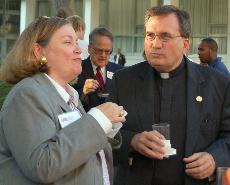Three Loyola colleges granted seven professors a minimum of $100,000 to conduct research in their respective fields at the annual Investiture Ceremony Friday in the Audubon room.
“Endowed professorships are designed to recruit superior new faculty and retain faculty whose research, teaching and public service work has uniquely contributed to the missions of their departments and institutions,” said Dori Orr, assistant director of Stewardship and Donor Relations.
The College of Business named assistant professor Brett P. Matherne, Ph.D., the Chase Minority Entrepreneurship Distinguished Professor of Business II. Matherne said he plans to use the endowment to investigate the economic recovery of New Orleans after Hurricane Katrina.
The College of Humanities and Natural Sciences granted endowments to six of its professors.
Among them was the Rev. James C. Carter, S.J, Ph.D., former president and provost of Loyola. The college named him the Gerald N. Gaston Distinguished Professor in Religion & Science. Carter said that he plans to use the endowment to fund a yearlong lecture series focusing on intelligent design in relation to science and religion.
HNS named philosophy professor, John P. Clark, Ph.D., the Gregory F. Curtin, S.J., Distinguished Professor in Humane Letters and the Professions. Clark expressed his desire to make social justice an active concept rather than an abstract one.
“He believed the mind and heart are closely related,” Clark said of Gregory Curtin, his colleague of thirty years.
Clark is the adviser to the Loyola Greens and the LUCAP Environmental Action Program.
Gary Herbert, Ph.D., received the Rev. Guy Lemieux, S.J., Sigma Alpha Kappa Distinguished Professorship. Herbert said he plans to use the endowment to continue his research on a scholarly manuscript which explores certain concepts of morality present in the philosophy of Immanuel Kant.
Herbert also plans to use the endowment to help fund his interdisciplinary journal “Human Rights Review.” “(The journal) publishes articles on the moral and political interpretation and application of human rights legislation in the international community, and all related human rights issues,” he said.
Professor of biology James L. Wee, Ph.D., received the Provost Distinguished Professorship III. Wee said he plans to explore “questions on the ecology and biosystematics of phytoplankton in low salinity estuaries such as Lake Pontchartrain.”
Catherine L. Wessinger, professor of the history of religions, received the Rev. H. James Yamauchi, S.J., Professorship in Arts and Sciences. She was not able to attend the investiture ceremony because she was presenting a paper at the Society for the Scientific Study of Religion. Wessinger sent her thanks: “The support of this professorship will enrich my scholarship and hence my teaching,” she said.
The College of Music and Fine Arts named Joseph Hebert, Ph.D., the Rita O. Huntsinger Distinguished Professor. Hebert is a professor of music education, coordinator of wind and percussion activities and director of bands at Loyola. Hebert said he is dedicated to the promotion of “excellence in teaching and scholarship in the field of music.”
Private donors provide the initial funding of a minimum of $60,000 for the professorships, which is then matched by an additional payment of $40,000 given by the Board of Regents State Matching Program.
Private donors decide the specific stipulations for the professorships such as what type of research is to be conducted and which college gets the donation. They may not decide, however, which individual gets the endowment, said Dr. Edward J. Kvet, dean of the College of Music and Fine Arts.
Individual professors apply for the professorships to their colleges on their own accord.
The colleges have committees, which include those who currently hold professorships, who review the candidates. The committees recommend a candidate to the dean who in turn decides on a candidate to recommend to the provost. The provost makes the final decision as to who receives the professorship.
According to Orr, the professorships last for an initial three years. The professorship can then be renewed upon the recommendation of the dean and concurrence provost.
Endowed professorships are not to be confused with endowed chairs, said Orr. Chairs receive 600,000 from private donors and 400,000 from the Board of Regents State Matching Program.
Loyola has fifty-nine endowed professorships, while only 8 professors have received endowed chairs.
The College of Law will hold a separate investiture ceremony on Friday, Nov. 3.
Alethia Picciola can be reached at ampiccio@loyno.edu.

Alumni and faculty congregate outside the Danna Center after a reception for Loyola’s Distinguished Professors at a banquet during Alumni Weekend, Friday evening. (Jenna Teter)

Members of Loyola faculty and administration listen while philosophy professor John P. Clark speaks during Friday’s annual Investiture Ceremony. (Jenna Teter)






